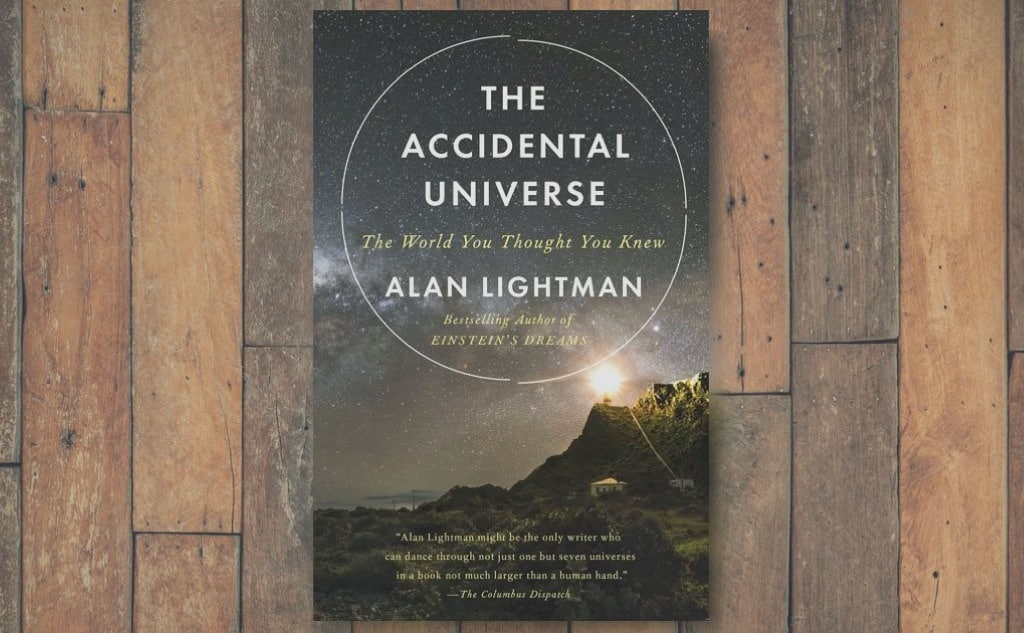This is a review of the book The Accidental Universe: The World You Thought You Knew by Alan Lightman.
The book’s poetic/philosophical voice will give you a unique outlook on the universe.
If you want to get a review of this book, then you’ve come to the right place.
Let’s dig right in!
“The Accidental Universe: The World You Thought You Knew” by Alan Lightman
- Title: The Accidental Universe: The World You Thought You Knew
- Author: Alan Lightman
- Subject(s): Astronomy, Physics, Cosmology, Anthropology, Psychology
- Skill-level: Intermediate
- Published: November 7, 2013, Pantheon
- Reason to read: Lightman’s poetic/philosophical voice will give you a unique outlook on the universe.
The Accidental Universe Review
The Accidental Universe: The World You Thought You Knew is similar to many astrophysics and cosmology books, exploring the universe’s evolution.
Yet, Lightman peers into the universe from such unique and fascinating vantage points.
From spirituality to symmetry to size, you explore the unfathomable, massive, and even shocking aspects of our known universe and beyond.

Plus, in typical Lightman fashion, each section is caked in anthropological and philosophical flavors.
Compared to typical attributes, Accidental Universe takes you on a mental journey through our cosmos in a refreshing way, asking some of life’s most sought-after questions.
Space Philosophy
Alan Lightman’s passion for both art and science (see bio below) never seize to paint his work unique.
After all, given the entire universe as a topic, abstract discussions and open-ended points are no simple task. Yet, Lightman sticks the landing. This is his wheelhouse.
Taking concepts like universal symmetry and weaving in human kind’s desire for it is a brilliant and refreshing approach.
Not to mention, Lightman often uses wonderful contrast, such as our devious desire for asymmetry.
Great Debate. Bad Arena.
As a whole, religion is a sensitive social topic. Furthermore, religion versus science is a wildly debated and highly charged match-up.
Frankly, viewpoints aside, I found this topic to be unnecessary, especially as its own devoted section.
However, I refuse to entirely hold Lightman accountable for two reasons.
Firstly, more or less, this book is a composite, assembled from individual essays.
Actually, as a standalone book, essay, or other literary work, this topic is prime.
Personally, it struck me as an awkward outlier among the book’s other subjects.
Second, Lightman, of course, offers generous banter towards both sides of this debate.
As a result, this section overall remains rather fair.
Yet, he also blatantly exclaims his particular views, thus, ultimately cheapening his generosities toward the opposing side.
Yet, I am technically committing the same crimes in this very paragraph.
Brevity
In literature, brevity is not easily achieved. Certainly, scientific writing is far from an exception.
In fact, attempting to explain subjects that no human totally understands often winds up requiring hundreds of pages.
Now, given the right subject, author, book, and more, I never mind a sizeable read.
But, I admire the brevity of Alan Lightman. Similar to his refreshing topical selections, the man carries such potent confidence in his work.
Sticking iron-clad to his points, leaving out the extraneous, Lightman drives this book from start to finish.
Again, for such a vast topic, his laser-focused approach is quite refreshing and admirable. Perhaps this is yet another benefit of a book compiled from individual essays.
Any avid science enthusiast will benefit from reading The Accidental Universe.

A pioneer in the field, Alan Lightman provides a one-of-a-kind reading experience full of odd but exceptional mashups like cosmology, philosophy, and psychology.
Plus, his wonderful precision makes this a rather quick, enjoyable read. Bookshelf-worthy, no doubt.
About Alan Lightman
Tennessee-born physicist and author Alan Lightman held a deep fascination for both science and art from a young age. Those familiar with Lightman’s work can agree that his philosophical, quasi-poetic approach to explaining sciences demonstrates this flawlessly.
During the 1970s and 80s, Lightman received a degree in physics from Princeton, his Ph.D. in theoretical physics from California Institute of Technology, and would be appointed to professor of science and writing and senior lecturer at renowned Massachusetts Institute of Technology (MIT).
Following years would only see further success for Lightman, cofounding MIT’s graduate science writing program and completely overhauling the university’s standards for communication.
Scientifically, Lightman earned his stripes through contributions for astrophysical extremes.
Among them are relativistic gravitational theory, accretion disk behaviors, extreme temperatures, densities, etc.
Alan Lightman’s prolific writing career, best known for a national bestseller, Einstein’s Dream, has spanned several decades, continuing through the modern-day.
Making national literary waves as runner-up for 1994 PEN New England/Boston Globe Award, 1998 NPR “Talk of the Nation” book club selection, and more, Lightman’s career has been both rich, unique, and enduring.
